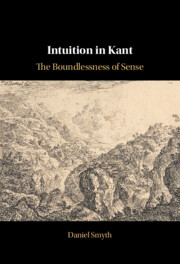Book contents
- Intuition in Kant
- Intuition in Kant
- Copyright page
- Epigraph
- Contents
- Acknowledgments
- Abbreviations, Citations, and Other Conventions
- Introduction
- 1 Reason’s Self-Knowledge and Kant’s Critical Methodology
- 2 Synthetic Judgment and Intuition
- 3 An Apperceptive Approach to the Transcendental Aesthetic
- 4 Exposition, Conceptual Analysis, and Apperception
- 5 Infinity, Discursivity, Givenness
- 6 Prolegomena to a Stufenleiter of Kantian Intuition
- 7 A Stufenleiter of Kantian Intuition, Part I
- 8 A Stufenleiter of Kantian Intuition, Part II
- Bibliography
- Index
2 - Synthetic Judgment and Intuition
The Sensibility/Understanding Distinction in the “Introduction”
Published online by Cambridge University Press: 07 March 2024
- Intuition in Kant
- Intuition in Kant
- Copyright page
- Epigraph
- Contents
- Acknowledgments
- Abbreviations, Citations, and Other Conventions
- Introduction
- 1 Reason’s Self-Knowledge and Kant’s Critical Methodology
- 2 Synthetic Judgment and Intuition
- 3 An Apperceptive Approach to the Transcendental Aesthetic
- 4 Exposition, Conceptual Analysis, and Apperception
- 5 Infinity, Discursivity, Givenness
- 6 Prolegomena to a Stufenleiter of Kantian Intuition
- 7 A Stufenleiter of Kantian Intuition, Part I
- 8 A Stufenleiter of Kantian Intuition, Part II
- Bibliography
- Index
Summary
I argue that the sensibility/understanding distinction announced at the end of Kant’s Introduction to the Critique can be justified via pure apperception. I first defend an account of the analytic/synthetic distinction, arguing that analytic judgments articulate intellectual grounds of truth. Synthetic judgments, then, are based on nonintellectual grounds of truth. This provides Kant’s “baseline conception” of receptive intuition as a capacity for representing nonintellectual grounds of truth. This is a “top-down” approach to intuition: a characterization of intuition not in terms of its intrinsic properties but in terms of a prior account of the intellect and its cognitive needs. I then argue that this version of the analytic/synthetic distinction follows from the idea that judgment must track the truth – an idea that is available to us via pure apperception. Thus, Kant’s baseline conception of intuition, as expressed in the sensibility/understanding distinction, can be justified via pure apperception.
Keywords
- Type
- Chapter
- Information
- Intuition in KantThe Boundlessness of Sense, pp. 44 - 72Publisher: Cambridge University PressPrint publication year: 2024

